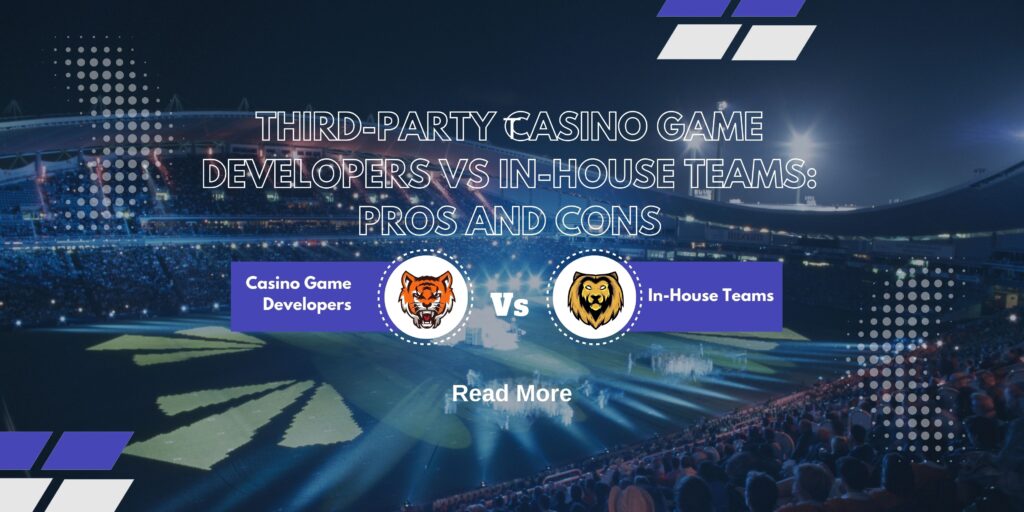
In the booming world of online gambling, the demand for innovative, engaging, and high-performance games has skyrocketed. As a result, businesses face a critical decision when it comes to building their game offerings: should they rely on in-house talent or collaborate with third-party casino game developers?
This blog explores the pros and cons of both approaches to help operators, entrepreneurs, and tech leads in the online casino game development space make informed decisions.
Understanding the Landscape of Casino Game Development
Casino game developers are specialized professionals or teams who design, develop, and deploy games for online casinos. These can include slot games, roulette, blackjack, poker, and even live dealer experiences. The quality and innovation of these games directly impact user acquisition, engagement, and retention.
Whether a company chooses to hire in-house developers or outsource to third-party vendors, the choice can significantly affect costs, time-to-market, scalability, and ultimately, competitive advantage.
Pros of Third-Party Casino Game Developers
1. Access to Expertise and Innovation
Third-party casino game developers often have years of experience and deep expertise in online casino game development. They work with multiple clients and stay ahead of the latest trends, compliance requirements, and technologies like HTML5, blockchain, and AI-based gaming.
2. Faster Time-to-Market
Established third-party developers have pre-built game engines and reusable assets that allow for faster game development and deployment. This is ideal for companies aiming to launch quickly or enter new markets fast.
3. Lower Upfront Costs
Outsourcing can be significantly cheaper than hiring and maintaining a full-time team. You don’t have to worry about salaries, benefits, or long recruitment cycles. Most third-party developers offer flexible pricing models—pay per game, monthly retainers, or revenue-sharing models.
4. Focus on Core Business
By outsourcing game development, casino operators can focus more on marketing, customer experience, and business strategy while the technical heavy lifting is handled by specialists.
5. Scalability
Need to release five new games in a month or customize a feature? Third-party developers can scale resources based on demand without delays or recruitment bottlenecks.
Cons of Third-Party Casino Game Developers
1. Less Control
Outsourcing can sometimes mean less control over the development process. Communication delays, mismatched expectations, or slower response times can occur, especially across time zones.
2. Intellectual Property (IP) Concerns
Depending on the agreement, the third-party vendor may retain partial or full ownership of the code or game concept, which could limit future use or adaptation.
3. Quality Variance
Not all third-party developers maintain the same standards. It’s critical to vet partners carefully and review portfolios, references, and previous client testimonials before signing a deal.
4. Security Risks
Sharing sensitive data or business concepts with external developers introduces the risk of intellectual theft or data breaches if not managed with proper NDAs and cybersecurity protocols.
Pros of In-House Casino Game Development Teams
1. Full Control and Customization
With in-house teams, you control every aspect of online casino game development—from the game mechanics and user interface to security measures and feature prioritization.
2. Better Communication and Collaboration
Being under one roof allows real-time collaboration, faster iteration, and more alignment between departments like design, development, and marketing.
3. Intellectual Property Ownership
All assets, source code, and concepts developed in-house remain the property of the company, offering more flexibility and long-term value.
Cons of In-House Development Teams
1. Higher Costs
Salaries, benefits, office space, software licenses, and recruitment all contribute to the high cost of maintaining an in-house team. For startups and smaller operators, this may not be financially feasible.
2. Longer Development Time
Building a game from scratch, especially without reusable components or experience, can take months or even years. This slows down time-to-market and delays revenue generation.
3. Limited Scalability
Unlike third-party vendors, scaling an in-house team involves lengthy hiring processes, onboarding, and training.
So, Which is Better?
There’s no one-size-fits-all answer. If you’re a well-funded company looking for long-term IP control and have time to build a skilled team, an in-house approach to online casino game development might be the way to go.
But if speed, flexibility, and cost-efficiency are your top priorities, partnering with experienced third-party casino game developers could offer a faster path to market dominance.
In many cases, a hybrid approach works best—keeping a lean in-house team for core operations while outsourcing specialized tasks to experts.
Final Thoughts
As the online gambling industry continues to expand in 2025 and beyond, the quality of your games will be a key differentiator. Whether you go in-house or third-party, choosing the right path in casino game development will directly impact your platform’s success.


